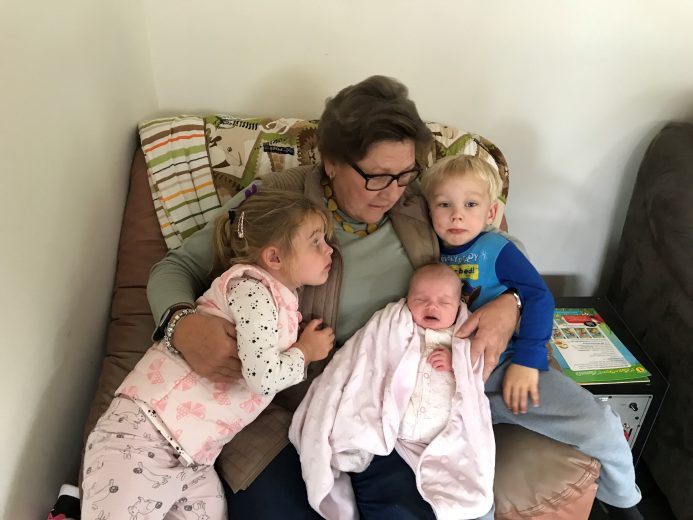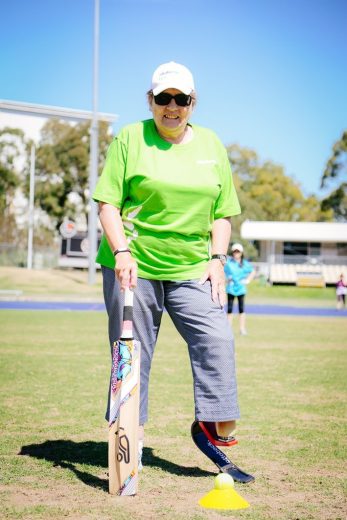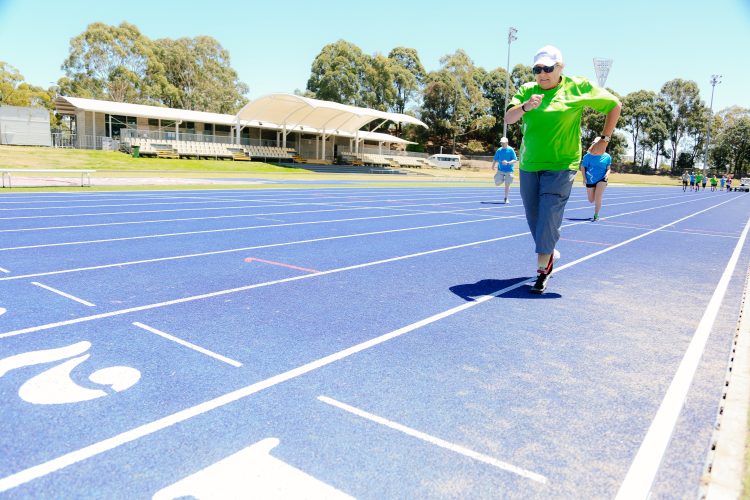- Home
- |
- About us
- |
- News and Events
- |
- Resources
- |
- Contact
- |
- Donate today
- Shop

“I didn’t have the chance to speak to any amputees before the surgery. Information on the internet was non-existent, and I really wanted insight to what life would be like.”
Originally from Sydney, Lyn is now a Tasmanian local, retired midwife and the President of the Tasmanian Amputee Society (TAS). Since retiring, Lyn has never been busier!
Lyn’s journey as an amputee began in 2001, when she had a cyst removed from the top of her foot which turned out to be an aggressive sarcoma.
“When I was diagnosed with cancer, my life took an unexpected turn. I was working in antenatal clinic at the time, and all my years of medical training and the language that I had used, didn’t help me to understand the meaning behind the biopsy and bone scans; and then the word – amputation. It was like entering a whole new world,” Lyn said. After the initial diagnosis, everything moved very quickly for Lyn. Within two days, her surgery had been planned and Lyn boarded a plane to Melbourne to start treatment.
During a brief discussion with her doctor, Lyn was given three options: the removal/amputation of her foot, intense radiation therapy which would lead to a non-functioning foot, or a below the knee amputation. Lyn researched as much as she could in the short time between her diagnosis and boarding the plane to Melbourne and believed that an amputation would result in the best possible outcome.
“I just really wanted to talk to someone who had walked that path. I knew that when I left Devonport I would return as an amputee,” Lyn said

Thanks to the prosthetist that Lyn was seeing at the time, she finally found the information she was looking for. “I was fortunate… My prosthetist was amazing and sourced a lot of material for me. He was also able to connect me to other amputees, which I had been craving to locate since my amputation,” Lyn said.
After her operation, Lyn’s main aim was to be back at work by Easter which gave her five months to complete rehabilitation and be up and walking. “I was fortunate that I did not have to have chemotherapy or radiation. I just had to learn to walk again,” Lyn said.
Initially she returned to work at Easter (as planned) on a short-shift rotation. Her workmates at the time were very accommodating which gave Lyn the flexibility she needed. Eventually she built up to working full-time in the antenatal clinic along with taking parent craft classes. Following her amputation, Lyn was able to deliver a few births, but could no longer kneel. “Trying to manoeuvre around the floor was not a good look and it did not fit into the safety guidelines,” Lyn said.
Now retired for just over four years, Lyn is a member of Soroptimist International Devonport, and does ‘Meals on Wheels’ twice a year. She is also actively involved with many community activities including being a part of the catering team at St John's Anglican Church, ‘Grans Van’ as well as supporting ‘White Ribbon Day’ which serves to inform the community about domestic violence in women.
For almost 15 years, Lyn has been involved with the Tasmania Amputee Society (TAS), an organisation established to provide Peer Support to amputees and their families. TAS advocates for better funding for prosthetics for amputees.
Currently in Tasmania, there is only one public prosthetic service provider something that TAS has been lobbying to change for over a decade. “We have examples where people travel to the mainland to receive prosthetic treatment because they want the opportunity to choose their provider,” she said.
There is a private service in Tasmania however that provider is unable to manufacture prosthetics under the public system and it means that amputees need to pay out of pocket costs to access their prosthetics should they choose to visit the private service. “It’s frustrating that in this day and age there is limited choice,” Lyn said.
“We all know how important the relationship between an amputee and their prosthetic provider is. Naturally there will be times when for whatever reason, people just don’t get along. This is why our community needs choice,” Lyn affirmed.
Now as President of TAS, Lyn and her team hope to create a partnership with Orthotic Prosthetic Services Tasmania (OPST) and the Department of Health and Human Services (DHHS), to expand the Peer Support Program across all hospitals in the state.
“The Peer Support Program is something that should be promoted among healthcare providers. Not every amputee may wish to receive Peer Support, and that’s fine, but those who do, should have the opportunity to meet with someone who has ‘been there before’. It’s important to build community connections and provide support for people facing this life changing challenge,” she said.

Lyn thinks that Peer Support just makes good sense. “Our Peer Support Program is designed to assist amputees and we believe it is critical to their health and wellbeing, and that of their families. “We are experiencing some difficulty getting in touch with new amputees which is a shame because I think the sooner a new amputee has contact with us (TAS) the quicker a lot of their fears can be put aside, and they can start moving forward in their journey,” Lyn said.
The Tasmanian Amputee Society (TAS) currently has 11 trained amputee Peer Support Volunteers all of whom are dedicated to make a difference to those in the community facing amputation and/or living with limb loss.
Lyn is always seeking to try new challenges and since becoming an amputee Lyn has spoken publicly about her journey. “If you had told me early in 2001 that I would be public speaking, I would have laughed at you, and said no! The very idea of speaking in public terrified me. However, I hoped that by sharing my story, other people would feel more comfortable about the thought and/or fears of amputation,” Lyn said.
“It reminded me that there are always new opportunities in this wonderful wide world of ours and that we should embrace new opportunities when they come along.
Keep up to date with our latest news, events and information